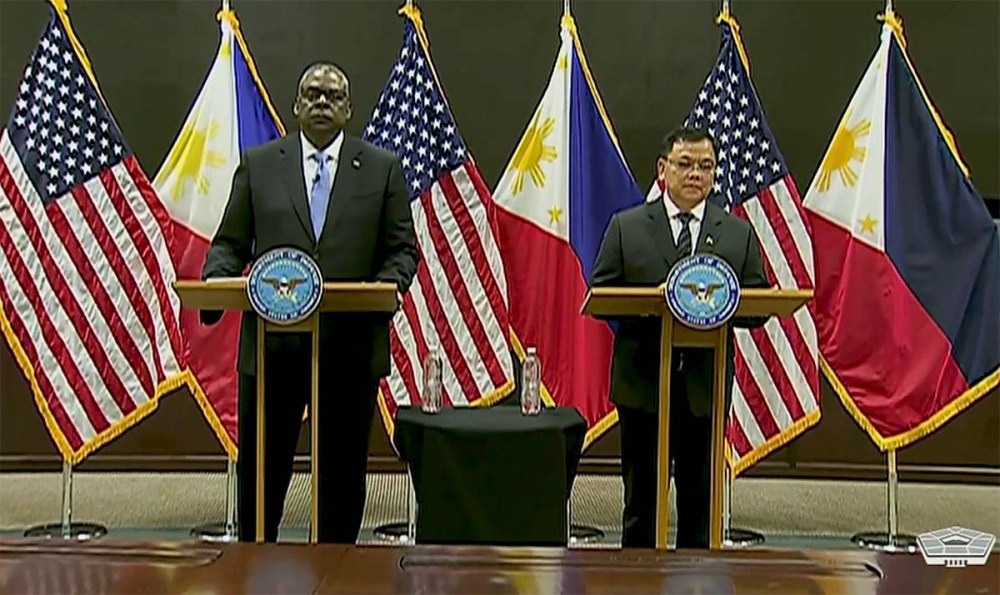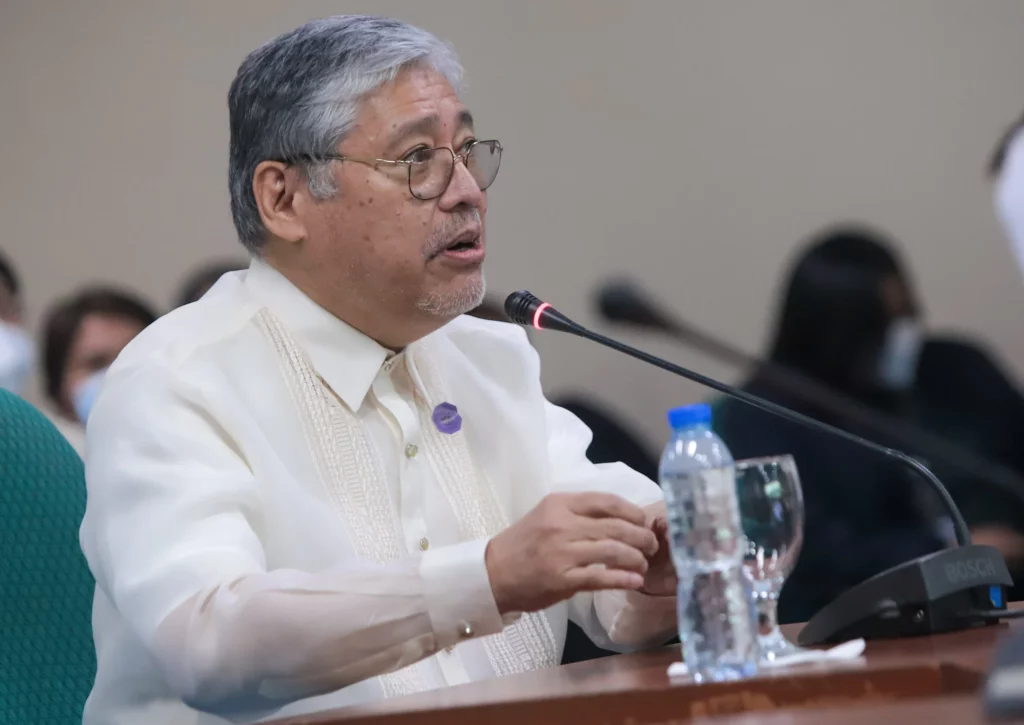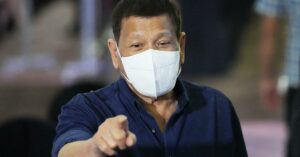

To justify the pursuance and accordingly strengthening commitments between the Philippines and the US under the MDT using the “China Threat Rhetoric” over the disputed South China Sea (SCS) and the Taiwan question is deceptive, misguided, and misleading.
It can be recalled that last Friday (30 September 2022), the Philippines and the United States defense officials met and discussed the ways of strengthening commitments under the Mutual Defense Treaty (MDT) accordingly amid rising concerns in the West Philippine Sea and tensions with China.
The meeting was held at the US Indo-Pacific Command in Honolulu, Hawaii, between US Defense Secretary Lloyd Austin and Philippine Defense Department Officer in Charge Jose Faustino Jr.
Amidst the many statements and exchanges between the two sides, Faustino’s most intriguing, controversial, and provocative statement was, “the Philippines will support the US when it comes to protecting Taiwan from Chinese aggression.” Yet, Faustino also said that the Philippines adheres to the One China Policy.
The One-China Policy/Principle declares that Taiwan is a territory of the People’s Republic of China (PRC). This is recognized by 181 countries, including the Philippines and the US.
In this regard, it is imperative to ask if Faustino was not contradicting himself and impersonating US strategic ambiguity, in which the US says one thing and does another. Is the Philippines conforming to the US practice of strategic ambiguity, also known as a policy of strategic uncertainty of being intentionally ambiguous on specific aspects of US foreign policy that suit their geostrategic and hegemonic interests at the expense of another country which, in short, bluntly means that US foreign policy toward the Taiwan question vis-à-vis the One China Principle is akin to a “two-faced” foreign policy loaded with double standards and double-talks?
Is this how we conduct our foreign policy now under President Ferdinand Marcos Jr.’s administration, a copycat to that of the US? Is this the nature of our foreign policy now under a Marcos Jr. Presidency? Really?
If that’s the case, we might end this pretense and charade that this administration pursues an independent foreign policy when its actions and pronouncements as early as now tell us a different story.
Are Faustino and the current administration unaware that one of the fundamental foundations of our bilateral relations with China is our adherence to the One China Principle/Policy, or are they just turning a blind eye to this to gratify and make Uncle Sam happy? Will we allow ourselves and our country to be used as a pawn or proxy of the United States chess match with China in the same manner that the Ukrainians allowed their country to be a pawn in the chess match of the US with Russia and the proxy war between Russia and the US with its NATO allies? Thus you have the Ukraine Crisis that is bleeding the world now. In the Ukraine Crisis, the Americans are ready to fight up to the last Ukrainian. Do we want this to happen to us? Do we want to be the next Ukraine in Asia?
Real talk dictates that Taiwan is just a pawn of the US in its chess match with China. Thus the Philippines must not get involved and should not allow the country to be the next pawn or proxy of the US in Asia. This is the crux of the matter and the most important thing that the current administration must consider and figure out, given the obsolete and lopsided MDT, Enhanced Defense Cooperation Agreement (EDCA), and the Visiting Forces Agreement (VFA).
Suppose, in any case, China decides to hasten the reunification of Taiwan to the mainland/motherland. In that case, this process is an internal affair of China, and countries like the Philippines should not get involved. If we do otherwise, it would mean we are interfering in China’s sovereign internal affairs, which will generate a backlash on our relations with China. These scenarios are for the current administration under PBBM to ponder, given that the US has made a lot of promises to Taiwan that it will come to its aid in any eventuality in the Taiwan Strait. Now with the latest statement of Faustino, it seems that we are mimicking the US promises to Taiwan without even reflecting on the cost and the consequences of such a subservient statement of Faustino to Uncle Sam at the expense of the country and the Filipino people.
It seems the current administration is not exercising prudence and does not employ sensitivity to geopolitical issues of great importance and consequence to us as a country and as a people. Is it not?
We should consider that the Philippines has no enemies and should not create one at all costs. Thus, no need to choose a side. Our relations with each country should be based on our national interests and on what’s good for the country and not for the benefit of other countries at our expense. The Philippines is a friend of China and the US. US enemies or adversaries are not the country’s enemies/adversaries, and the current administration must emphasize this under the leadership of President Ferdinand Marcos Jr. As a country, we should uphold our national interests. And I guess avoiding being a pawn or proxy of the United States and avoiding being dragged into any conflict, not our own making, is, I think, very much part of our national interests as a sovereign nation-state.
MDT
On another note, the statements of Foreign Affairs Secretary Enrique Manalo during the Senate Finance Committee Hearing on the Department of Foreign Affairs 2023 Budget on September 30, 2022, were indeed puzzling and astonishing that for a few seconds while watching the hearing, I was wondering if he is our DFA Secretary or the US Ambassador to the Philippines serving as the mouthpiece of the United States government.
During the session, Sen. Robin Padilla asked Manalo, “Many of our countrymen believe that when war breaks out there (Taiwan and China), we will be involved, and America will defend us. How true is this?.”
Manalo replied, “The United States is committed to defending the Philippines. Any attack against the Philippines is an attack against the United States. Talks are ongoing to clarify the implementation of the Mutual Defense Treaty. Clarificatory talks started two years ago.
But the statement of Manalo can be quickly challenged by the fact that many times over, the US failed the Philippines as an ally.
Did Manalo not remember while responding to the question of the good Senator Padilla US strategic ambivalence concerning the MDT and what Hilary Clinton, US Secretary of State at the time, said concerning the “Scarborough Shoal Stand-Off” between the Philippines and China?
“The United States does not take a position on any territorial claim because any nation with a claim has a right to assert it.”
It was even ironic when Clinton uttered such a statement because she spoke of it during the celebration of the 60th anniversary of the US-Philippine MDT in November 2011.
Another peek at US strategic ambivalence concerning the MDT was the refusal of then-President Barack Obama to extend similar reaffirmation to what he promised to the Japanese surrounding the territorial dispute over the Senkaku Islands between Japan and China.
He told the Japanese that, indeed, “the US will defend Japan in its island dispute with China as covered by Article V of the US-Japan Treaty,” The text/language is identical to the US-Philippine security pact.
Obama did not extend a similar reiteration and reaffirmation for the Philippines to the disappointment and mortification of many Filipinos because of his explicit commitments to Japan but not to the Philippines.
What about during the Marawi Siege, where former President Rodrigo Duterte was trying to buy arms from the US needed to fight the Maute terrorist group in Marawi, but the US turned down the plea of the former president because of allegedly “human rights” violations of the former president’s administration’s fight against illegal drugs. China and Russia supplied the necessary arms to reinforce our soldiers while fighting the terrorists during the Marawi Siege.
Moreover, it is not only in the Philippines that the US failed in many respects in fulfilling its promises and obligations as a party to international agreements or bilateral agreements with other countries. The US failed other countries, too, and the latest case in point is China on the Taiwan Strait question.
The visit of Nancy Pelosi to Taiwan was a serious violation of the One-China Principle/Policy and the provisions of the three China-U.S. joint communiqués.
I can elaborate and provide many similar examples, but all these boils down to one thing, the United States is NOT a reliable and trustworthy partner that will honor its part of the bargain. Whenever convenient and suits their hegemonic interests, the United States will unilaterally act even to the point of violating international laws and defying basic norms of international relations at the expense of other countries and the world.
Are these examples not clear indications that the US failed the Philippines and other countries in many respects? Are we to trust the US with all our hearts and mind then? Your guess is good as mine.
Are we blind and naïve as a nation that we can’t draw lessons and wisdom from our experience and the experience of other countries when it comes to Uncle Sam’s historical records of breaking its promises vis-à-vis other countries, or are we just subservient to the bidding of Uncle Same? How many examples do we need to be wise enough not to be deceived for the nth time?
MDT Revisiting?
Another intriguing and titillating statement of Manalo during the said senate hearing last Friday was, according to him, it is better to clarify the implementing rules of the MDT with the US than to revisit the entire agreement. I find this statement baffling.
If my recollection serves me right, on 20 December 2018, then Defense Secretary Delfin Lorenzana directed a review of the almost 70-year-old treaty between the Philippines and the US to see if it is still relevant to the Philippines’ “national interests.” Lorenzana reiterated that the end goal of the review is either “to maintain it, strengthen it, or scrap it, and to know if indeed the MDT is still valid and relevant to this day.”
The thing here is before clarifying the so-called implementing rules of the MDT; I think the most pragmatic and imperative thing to do is to review and revisit the main MDT document thoroughly and comprehensively from which the said implementing rules originated and were drawn.
To note, the MDT, in its form, content, and substance, contains provisions that are not advantageous to the Philippines. The existing MDT is somewhat of a “non-mutual” mutual defense treaty. The existing MDT, even the VFA, and EDCA have many infirmities, lopsided and skewed provisions favorable more to the US than to the Philippines that need to be revisited and reassessed. This is the heart of the matter.
Also, there is the issue of “security-sovereignty dilemma or ambivalence,” which refers to the VAGUE, INFORMAL, and VERBAL assurance of the US that it would immediately extend assistance in case a foreign aggressor attacks the Philippines as parroted by Foreign Secretary Manalo during the Senate Finance Committee Hearing on DFA 2023 Budget last Friday (30 September 2022).
The MDT is not self-executory or has no “instant retaliatory clause.” The US Congress has to be consulted first and seek its approval before any retaliatory action can be taken. This is supposedly one of the most critical considerations why the MDT has to be revisited or scrapped altogether if the US cannot provide a straightforward clarification on this matter in writing, not just verbally. Given this, I think, as a country, we should take the verbal assurances of Americans with a grain of salt.
In addition, there was no ratification of MDT, no ratification for the VFA, and no ratification of EDCA on the part of the United States as a contracting party. This alone is already an important consideration why we need to revisit or scrap these military agreements with the US, for it goes against the requirements of our existing Constitution when entering into a treaty with another country.
Furthermore, the original rationale behind crafting the MDT was to guard against a rearmed Japan after World War II, with the Soviet Union as the convenient secondary threat because of the Cold War. But such threats are gone now.
Conclusion
Again, real talk dictates that as a country, the Philippines needs a genuine and authentic independent foreign policy in every sense, and that would mean complete neutrality and positioning itself as non-aligned. In doing so, time is of the essence. Abrogating, revisiting, or renegotiating the MDT, EDCA, and the VFA is like a liberation for the Philippines from the indirect control and its subservience or the state of being submissive to the US, especially in military aspects. Whoever doesn’t understand this is a lost cause.
Source: Asian Century Journal
https://asiancenturyph.com/2022/10/05/naivety-or-subservience/


